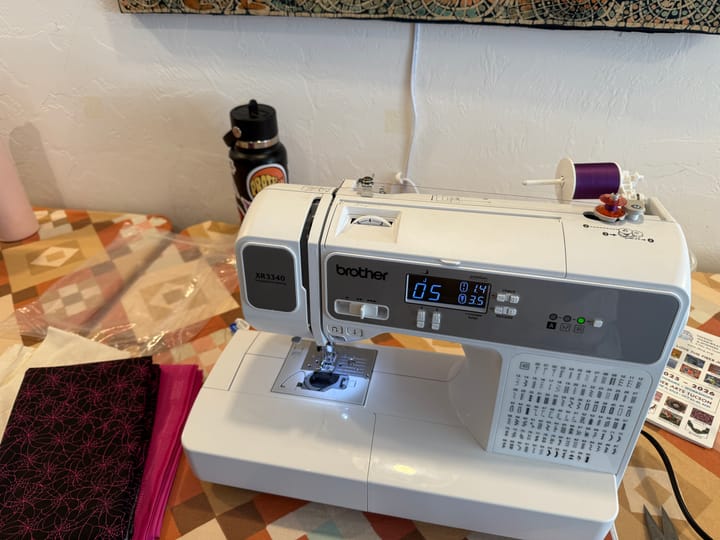Families protest El Rio’s halt to gender-affirming care
After El Rio Community Health Center ended gender-affirming care for minors, Tucson families rallied in protest to defend the rights and health of trans and nonbinary youth.

At just 11 years old, Violet is known for her bold spirit, sharp wit and unwavering loyalty to her friends, especially those in the LGBTQ+ community.
Whether she’s building a throne room out of couch cushions or calmly correcting adults who misgender her classmates, Violet, who is transgender, shows a clarity and determination that led her and her family to stand on the front lines of a growing national battle: the fight to protect gender-affirming care for trans and nonbinary youth.
Violet’s parents, Michelle and Andy, helped organize a rally last month in response to El Rio Community Health Center’s decision to stop providing gender-affirming care to minors. Dozens of community members came out to support the cause.
"She's a fierce defender (of) her friends, especially her trans and non-binary friends," said Michelle, recalling an incident in which Violet corrected a stranger who misgendered her nonbinary friend, Dylan. “It was just cool to see her stand up in that moment and be like, ‘No, that's not okay. I'm gonna defend my friend. I was really proud of her.”
Violet is no stranger to advocating for her community. Her family was one of the few from Arizona planning to testify before the Supreme Court in December, where justices heard a challenge to a Tennessee law banning gender-affirming care for minors.
Violet's empathy reflects a broader reality for many transgender and nonbinary youth, who often learn to navigate the world with both resilience and vulnerability.
Andy and Michelle say they had been picking up social cues about their daughter’s true gender identity since she was young. Under the supervision of a pediatric physician, both parents learned to support their daughter’s needs.
“I didn't do research. I educated myself,” Andy said. “We were educating ourselves on the fact that trans people exist, have always existed, that trans kids have always existed. Coming to understand that and what that meant for what we were seeing in our kid took us some time to understand it, but once we did, there was no question.”
Andy and Michelle met Dylan’s mother and rally co-organizer, Hazel, at a local support group for family members of trans and nonbinary children.
“Dylan loves different advocacy things,” Hazel said. “They have a really strong sense of social justice and standing up for what's fair.”
When Dylan returned to school after the pandemic, they told Hazel that they didn’t fit in with the boys or girls in their class.
“I said, ‘Oh no, they don't have friends,’” Hazel said. “But they said, ‘No, I have friends. I just don't feel like a boy or a girl.’”
With a background in behavioral health, Hazel guided Dylan through conversations about gender identity using books and other resources, until one day, Dylan lit up with recognition and said, “That’s me!” after discovering they were nonbinary.
“The goal for me is to (have) my partner and I to be the best parents we can for trans kids,” Hazel said.
The support group not only provides a place where transgender kids can foster friendships, but it also fosters community among parents, creating a space to help navigate school, legal and medical systems.
“I feel like we learn about how we can become better advocates for our kids, also,” Andy said. “It's an opportunity for the kids to get together and just play with other kids where they can be their full, authentic selves, and they don't have to worry about (whether) this is a safe place.”
In January, President Donald Trump issued an executive order barring gender-affirming care for youth under the age of 19 and authorizing the withdrawal of grant funding for medical providers if they were found providing care otherwise.
In February, Attorney General Pam Bondi issued a memorandum regarding the executive order, announcing that the Department of Justice would investigate health care programs that file claims related to “radical gender experimentation” under the False Claims Act.
The memo also announced an investigation into pharmaceutical companies and medical providers for what the Department of Justice considers “misleading” and “off-label” statements regarding the effects of hormone replacement therapy.
In response, El Rio, one of the largest LGBTQ+ care providers in Tucson, removed information from its website related to transgender health care and, in May, officially stopped providing gender-affirming care to trans youth.
The decision left patients and their parents searching for answers.
El Rio “had stated that they ended prescriptions and treatment therapy for trans kids under 19, but immediately afterward, there was some confusion about what their new policy was,” Hazel said.
In 2024, more than 30 organizations, including the World Health Organization and the American Academy of Pediatrics, reaffirmed that evidence-based gender-affirming health care is recommended for youth who identify as trans or nonbinary. This care may consist of mental health support, social services and medical interventions, such as puberty blockers and hormone therapy, in consultation with a youth’s pediatric team.
Gender-affirming care may also include family and community support for the youth’s identity, which has been shown to lead to better mental health outcomes, such as higher life satisfaction, lower perceived burden of being transgender, and fewer depressive symptoms, according to the Journal of Adolescent Health.
But it’s not just patients and their parents who are criticizing El Rio’s response to the order.
“In contrast to the recent (U.S. Department of Health and Human Services) report on gender-affirming care, which has been deeply critiqued and debunked by the scientific community, decades of research has shown that access to gender-affirming care, when indicated, is associated with a myriad of optimal health outcomes, and that denying access to necessary care is associated with compromised health,” Dr. Russell Toomey, a professor of human development and family science at the University of Arizona, wrote in a recent opinion piece for the Arizona Daily Star.
The rally drew more than 100 people, with protesters walking from downtown’s Evo A. DeConcini Federal Courthouse to El Rio’s administrative building a block away, holding signs and calling for the validation of rights for trans youth.
“Say it loud, say it clear, trans rights now, no more fear,” protesters yelled.
Organizers said in a news release preceding the rally that parents were demanding the clinic “resume providing best-practice, evidence-based gender-affirming care for trans youth after the organization abruptly stopped all pharmaceutical care.”
“I know a lot of (youth) don't have supportive homes or communities that they can surround themselves with in this kind of dark time,” Michelle said. “I want as much as I can to send that message that we're going to fight for you, we see you, we hear you, and we're not going to give up. We are hoping that we will be able to challenge allies to speak up more and be more vocal. With all of the anti-trans rhetoric, it's not as safe for trans people to be visible right now. It's not fair for them to be having to be the only ones out there fighting for equality.”
When the group arrived at the El Rio building, youth attendees were given an opportunity to speak about their experiences.
“They have given our community gender-affirming care for years and years. Now they're afraid of getting shut down because the Trump administration thinks that trans kids are not real,” Violet said, addressing the group. “Some things are up for debate, but my gender is not one of them.”
Adrian Islas, a 17-year-old transgender youth, told the crowd that beginning testosterone treatment saved his life.
“When my mother first took me to Rio to discuss starting testosterone, I felt immense joy and gratitude,” Islas said. “Before starting testosterone, I struggled deeply with my mental health, feeling suicidal, uncomfortable in my body, and constantly misunderstood. I finally began to feel like myself for the first time in many years. I felt affirmed and I felt seen.”
But El Rio’s decision has changed all that, Islas said.
“Now, with El Rio cutting gender-affirming care, I and so many others can no longer access the treatment we need. I am scared of what the future holds for us,” he said.
At the rally’s conclusion, Hazel carried a basket of torn feathers to the door of the administrative building — a metaphor for El Rio clipping the wings of trans youth, taking away their ability to fly. Security promptly asked her to leave.
“Another reason to do this for us is to be in community,” Andy said. “We find strength and resilience and mutual support by being together, by raising our voices together, by standing together. Our kids see us doing that for them, and I think that's important.”
Topacio “Topaz” Servellon is a freelance journalist based in Tucson. Contact them at topacioserve@gmail.com.
Tucson Spotlight is a community-based newsroom that provides paid opportunities for students and rising journalists in Southern Arizona. Please support our work with a paid subscription.



